https://www.freepressjournal.in/interviews/israel-water-authority-spokesperson-uri-schor-we-ensure-over-50-of-water-available-is-man-made
Interview — Uri Schor, Spokesperson, Israel Water Authority
Managing a miracle called water in Israel and the world
RN Bhaskar – September 7, 2019
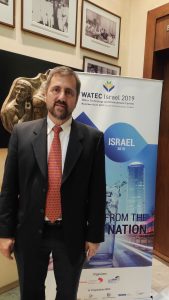 Few countries in the world understand water as well as Israel does. It has managed to survive and even thrive in a region that was known to be desert and — at best – arid territory.
Few countries in the world understand water as well as Israel does. It has managed to survive and even thrive in a region that was known to be desert and — at best – arid territory.
The agency which is responsible for ensuring that the country remains water self-sufficient is the Israel Water Authority. Its spokesperson, Uri Schor, was in Mumbai last week, to have a discussion with officials of the Maharashtra state government on how to improve its water management. Earlier, he had discussions with the water authorities in Delhi as well.
Uri, like almost all Israelis, did his military service from 1978 to 1981, and pursued his studies in economics and statistics from the The Hebrew University, and then in Advertising, Marketing and Communications in Tel Aviv University.
His is currently spokesman of the Israeli Water Authority. In an exclusive discussion with RN Bhaskar, he explains what goes in for ensuring effective water management.
Given below are edited excerpts:
RNB: Israel has little water through rains. Can you give us a perspective?
Uri Schor: True, Israel has very little water. Consider this. Mumbai gets over 200 cm of rain each year. At times it can be as much as 600 cm. Other cities in India also get reasonable amounts of rainfall. Even Rajasthan which is considered a desert gets more water than Israel. In Israel – the bustling city of Eilat is a good example, we get just 0.21cm of rain each year.
Yet go to EIlat, You will find lawns, gardens, swimming pools – all signs of decent water availability which can help build a community. People can live there with enough water for their needs.
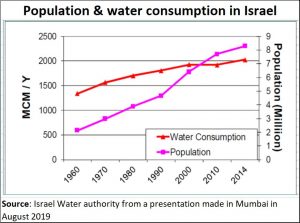 What we do is to maximise the potential of what we get through rainfall, we try to conserve almost every bit of water we get through the rains, and we recycle all water that many countries consider waste.
What we do is to maximise the potential of what we get through rainfall, we try to conserve almost every bit of water we get through the rains, and we recycle all water that many countries consider waste.
Can you talk about your recycling achievements?
Israel today ensures that more than 50% of the water that is available is man-made water. This means water that is created by us out of waste water, or through desalination. Since we do not get any rain water, we opt for desalination only to meet the gape between the rain water we get, the water we can recycle and the demand we think the country will have to face in the future. We will continue building desalination plants, and are among the cheapest producers of desalined water – around 50 cents per cubic metre (around three paise per litre). So if we get rain, we reduce the amount of desalined water produced. If it does not, we increase our production. All our desalination processes are on a public-private partnership basis and this flexibility of production is built into the contracts.
But desalination is just a fraction of what we need. So we focus on recycling. Today, we treat almost 94% of the waste water – which includes both industrial effluent and 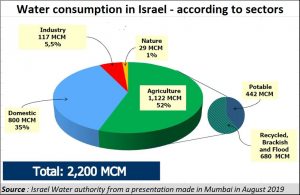 sewage water — and recycle almost 85% of our waste water. Unlike some countries which offer recycled water for drinking as well (there is nothing wrong with that), we give the recycled water for agriculture and for industry. Our aim is to increase the amount of recycling to around 90%, after which it gets too expensive. For human consumption, we offer a mix of fresh water from rains, ground water, and desalined water.
sewage water — and recycle almost 85% of our waste water. Unlike some countries which offer recycled water for drinking as well (there is nothing wrong with that), we give the recycled water for agriculture and for industry. Our aim is to increase the amount of recycling to around 90%, after which it gets too expensive. For human consumption, we offer a mix of fresh water from rains, ground water, and desalined water.
How do you control water consumption?
We do it through raising awareness. Increasing water prices is just one way of ensuring that people realise that water has a cost. But awareness is more crucial. If people are aware about the need to conserve water, there is less resentment, and willing compliance.
For this we run campaigns which are carefully designed to achieve specific targets. In this area, we are different from product advertising, which aims at making a potential customer come in and buy the item. If the product is good, he will buy it again. The campaign is not required any more. If the product is bad, no amount of campaigning will make the product work.
With water, we have to actually convince people to manage with less water. We have to convince them that even a dripping tap can mean a loss of 60 litres a day. We need them to realise that just reducing shower time by 2 minutes each day actually makes the water level in the Sea of Galilee (the largest freshwater lake in Israel). WE show campaigns which show people how skin could flake off if the body did not get enough water, and how crucial it is for human existence. We ensure that drip irrigation is meant not only for farms. You will see it in public gardens, on grass lawns, even in houses where families grow a few plants.
As a result, our total water consumption has declined, even as our population has grown. This is although, since 1948 when Israel became independent, water consumption has increased ten-fold.
As that means more water demand, partly because of the sheer numbers. It means more water because of changing lifestyles, because of greater affluence. But we had to find ways to ensure that consumption at the aggregate level declined. I cannot think of any other country that has managed this.
You talk of water conservation. What are the ways you do this?
Water conservation means building dams, lakes and storage areas to catch as much of the rain water as is possible. It means trying to ensure that very little of this water goes off into the sea.
But it also means reducing leakages. The average leakage of water through pipes and canals is estimated at 25% world-wide. In India it can be as high as 40-60%.
And preventing leakages is not always easy. At times it means plugging leaks in pipes that are overground and accessible. But what do you do if the pipe is underground, under a city. So we developed technologies to identify leakages even where pipes cannot be seen. We even use satellite imagery. Then we create technology that can repaid leakages from the outside. We also developed technologies that can seal the leakages from inside pipes, thus removing the need to damage existing building which have been constructed over the pipes. We have measurement systems for water which is underground, and water which is supplied through taps. We have systems to reduce the leakage. In Israel we have one of the lowest non-revenue water (NRW) are less than 10%.
That is why we hold a water conference every three years. It introduces the world to new technologies we have in water and waste management. This year it is being held from November 18-21, and I do think many water administrators from India will be there.









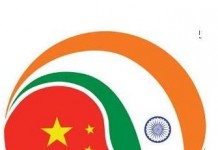


















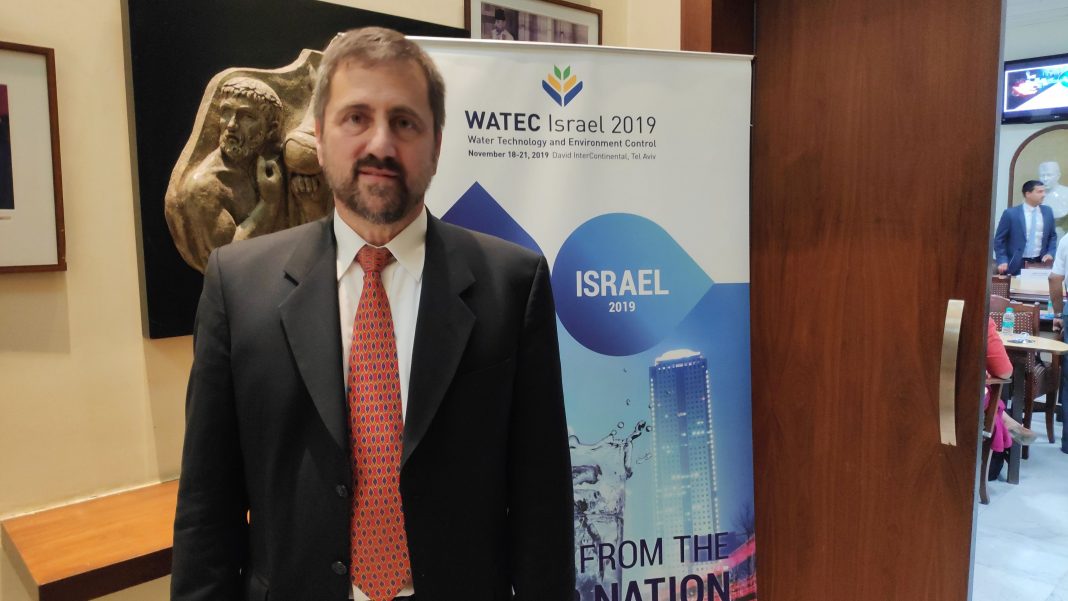











COMMENTS